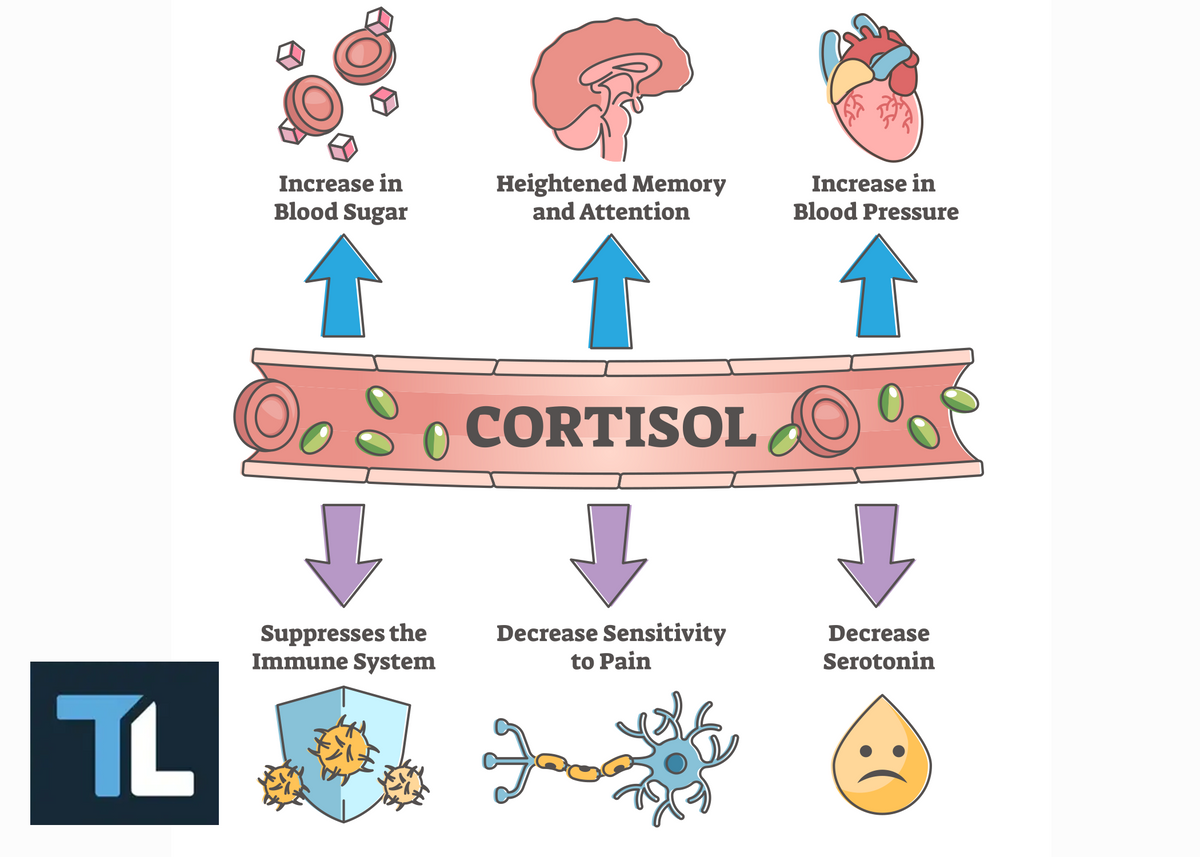Symptoms of High Cortisol in Women: What to Watch For

Cortisol, often referred to as "the stress hormone", plays a vital role in various important bodily functions such as metabolism, immune response, and blood pressure regulation. While cortisol is essential for our survival, its delicate balance can significantly impact health, particularly for women.
Many people have of cortisol, but they don't understand what it is, how it functions in the body, and how to manage it. Many women experience side effects from high cortisol and may not know it's the culprit. By understanding the symptoms of high cortisol and their implications, women can take action to manage their cortisol and improve their overall health.
What is Cortisol?
Cortisol is an essential hormone, often referred to as the stress hormone, that is produced in the adrenal glands and has many functions. Cortisol plays a major role in the body's stress response, much like the body's alarm system, regulating metabolism, sleeping and waking cycles, immune response, blood sugar levels, and reducing inflammation. It is released in the body on a 24-hour schedule.
Cortisol is an important hormone, but having irregular levels can have major side effects on nearly every organ system in the body. On one end of the spectrum, low cortisol levels in the body are often a result of a condition called Addison's disease. Those who suffer from Addison's disease have reduced cortisol levels due to adrenal insufficiency, where the body doesn't make enough of certain hormones, including cortisol.
Cortisol plays many important roles in the body including regulating blood pressure and regulating blood sugar, as cortisol has counterbalancing effects for insulin.
How Cortisol Works
The way cortisol works in a multistep process that starts with a stress response in the body. When the brain's amygdala detects a threat it send a signal to the hypothalamus, which is the part of the brain that regulates body functions like managing temperature, mood, sleep, and libido.
In response to the stressor, the hypothalamus produces corticotropin releasing hormone (CRH). CRH enters the anterior pituitary gland through the bloodstream and signals the release of adrenocorticotropic hormone (ACTH).
ACTH stimulates the adrenal glands, which then produce cortisol. The adrenal glands are made up of two types of adrenal tissue: adrenal medulla and the cortex, which produces the steroid hormone. Cortisol secretion is released into the bloodstream and increases blood glucose, regulates immune response, and maintains blood pressure. This is all a part of the hypothalamic pituitary adrenal axis, the communication system between the hypothalamus, the pituitary gland, and the adrenal glands.
As stress is a common factor among the adult population, it is possible you're being affected by high cortisol levels without even realizing it. Chronic levels of stress can be detrimental to overall health and wellness and may show up as Cushing's Disease, insulin resistance and diabetes, reduced immune function, heart disease, stroke, hypertension, increase of anxiety and depression, and issues with sleep quality and fatigue.
Common Causes of Unregulated Cortisol Levels in Women
There are a handful of factors that can contribute to elevated cortisol levels in women.
a few of the main ones are:
-
Chronic Stress: Ongoing stress is one of the primary causes of high levels of cortisol. When the body is in a constant state of stress, it is living in high alert and triggers the sympathetic nervous system. This puts the body in fight-or-flight mode, and the adrenal glands release excess cortisol to help regulate the body.
Once the threat is over, the parasympathetic nervous system regulates and reduces cortisol levels by slowing heart rate, lowering blood pressure, and promoting relaxation among other things. Longterm stress does not allow for the parasympathetic nervous system to activate, meaning cortisol levels stay high. Chronic stress creates a negative feedback loop where cortisol levels don't drop enough to find true relaxation.
-
Cushing's Syndrome: Cushing's syndrome is the effect of high, long-term cortisol production. It could be the result of tumors in the pituitary gland or adrenal glands, or from certain medications. It can cause fatty deposits between the shoulder blades and upper arms, weight gain in the face and abdomen, purple stretch marks, muscle weakness, excessive growth of facial and body hair, and issues within reproductive systems.
-
Addison's Disease: This is cause by adrenal insufficiency. Addison's disease is when the adrenal glands create too little cortisol, and can be life threatening in severe cases. Some symptoms of Addison's include low blood sugar, salt cravings, low blood pressure, fatigue, and joint pain.
-
Secondary Adrenal Insufficiency: This is similar, but more common than Addison's disease. This stems from issues with the pituitary gland, which synthesizes ACTH, the chemical that signals to the adrenal gland to create cortisol. When the adrenal glands don't receive the message, they may shrink or be rendered obsolete.
-
Medication and Drug Use: Certain types of medication can have implications on the body's cortisol level. This includes use of anti-depressants, anti-psychotics, and stimulants. Caffeine is also a common culprit. Make sure to manage how much caffeine you're drinking, and try to consume a meal before you drink your coffee to manage your levels of cortisol.

Symptoms of High Cortisol Levels in Females
If you're concerned about high cortisol levels, there are a few different symptoms to look out for and pay attention to:
-
Weight Gain: Weight gain is one of the most common symptoms of high cortisol levels. One study found that as BMI increases, so does salivary cortisol, which is the measurement of cortisol levels in saliva. High cortisol is known to have significant effect on body metabolism.
-
Fatigue and Insomnia: Cortisol is released over a 24 hour cycle with its highest peak arriving in early morning around nine. Elevated levels of cortisol can make it difficult to relax and initiate sleep. It may also cause you to wake more often throughout the night and cause restlessness. It can lead to lighter sleep, reduce REM sleep, and cause insomnia.
-
Mood Swings and Depression: Emotional effects of elevated cortisol include greater mood swings, higher stress, and one study found a connection between high cortisol levels and mental disorders such as depression, anxiety, and suicide ideation.
-
Irregular Menstrual Cycles: When stress creates too much cortisol, it can interrupt hormone production and result in abnormal periods or, if the increased cortisol is chronic, the loss of menstruation overall.
-
Weakened Immune System: Although normal levels of cortisol can be beneficial as an anti-inflammatory, chronically high levels of cortisol can cause the immune system to become resistant. The study also found that as we age, we're less capable of responding to stressors as well as we did in early age.
-
Skin Changes: There are possible skin changes that result from high levels of cortisol including the appearance of, or increase in, acne present on an individual. And, as high cortisol can cause issues with immune function, it can also slow the healing of wounds.
If you're experiencing any of these common signs of unregulated cortisol you should reach out to your health care provider for testing to ensure your cortisol levels are in a normal range.
Health Implications of Prolonged High Cortisol
Although cortisol is a necessary steroid hormone needed to regulate various functions in the body, long term high levels of cortisol can lead to several health issues. It is important for women to mitigate their cortisol levels as it may have serious impacts for their health specifically.
Pay extra attention to symptoms of high cortisol levels in females, as they have been linked to infertility in women across many studies. Whether you're noticing chronic high blood pressure, high blood sugar, muscle weakness, weight gain, or insomnia, it is worth being vigilant of these symptoms and taking action.
One study found a relationship between weak bones and Cushing's syndrome when their research found that just over 80 percent of patients with Cushing's syndrome had experienced bone loss and higher levels of osteoporosis.
How to Diagnose High Cortisol Levels
If you struggle with the ramifications of too much cortisol, there are several ways to check your levels. As cortisol levels vary throughout the day, there may be multiple ways or times your doctor may test you. Most tests are quick, easy, and painless.
-
Serum Cortisol Test: this tests cortisol levels in the blood stream to measure cortisol levels in the body.
-
Urine Test: This is usually taken over a 24-hour period to test levels in the urine throughout the day as they ebb and flow, usually being the highest in the morning.
-
Saliva Test: These measure the hormone through saliva, generally collected in the evening.
-
ACTH Stimulation Check: This measures the adrenal glands' as they respond to adrenocorticotropic hormone and assess overall function of the adrenal function.
Although this is not an exhaustive list of ways to test, it includes the most common and accurate ways to test for over or under producing cortisol.
Managing and Reducing High Cortisol Levels
There are several things you can do to manage and reduce your stress you experience on a daily basis or after high levels for an extended period. Elevated cortisol is commonly caused by things going on in our everyday lives, but with simple lifestyle changes, you may be able to take small steps with big pay offs. Learning into things that make you happy or that create endorphins are good things to tap into. This can include meditating, doing breathing exercises, going for walks, finding a hobby that helps you relax, or making time to exercise.
Other lifestyle changes like getting a good night's sleep, having a bedtime routine, eating nutritious foods, and doing things that regulate your nervous system may lower cortisol levels. Working the night shift can make it difficult to implement, but your bedtime routine (whether it is during the daytime or nighttime) can be a major combatant for elevated cortisol.
Medical intervention may be necessary if you feel you are not able to lower the cortisol levels on your own. Reaching out to a doctor who can run tests to check levels and prescribe medication based on the findings, or finding natural herbs, supplements, and lifestyle changes that may aid in reducing cortisol levels.
FAQs about High Cortisol Levels in Women
Can High Cortisol Levels Cause Infertility?
Although more research is necessary, elevated cortisol can lead to complications with fertility. As cortisol is a stress hormone, high levels of stress over prolonged periods of time may lead to issues like irregular menstruation, issues regulating hormones like estrogen and progesterone, and the side effects of high stress can lead to further issues like a drop in sex drive.
What are the Signs that Cortisol Levels are Returning to Normal?
Although it isn't a one size fits all, some signs you may notice are better, more restful sleep, lower levels of stress, increased energy, improved digestion, improved immune function, weight loss, return of libido, and normalized blood pressure and blood sugar to name a few.
How Does Cortisol Affect Weight Loss Efforts?
As a common symptom of high cortisol is weight gain, it may be difficult to achieve weight loss goals if your levels are constantly elevated. The side effects of heightened cortisol may additionally make it difficult for weight loss efforts as it can affect your sleeping and eating patterns which are both important factors for weight loss.
Conclusion
Recognizing the symptoms of high cortisol is crucial for women's health, as prolonged elevation can contribute to issues like weight gain, fatigue, and disease. By identifying these early signs, women can take steps to manage stress and seek medical guidance.
Lifestyle changes, such as improved sleep and stress management techniques, can help regulate cortisol levels. Ultimately, understanding and addressing high cortisol is essential for promoting long-term health and preventing serious health issues for the future.









